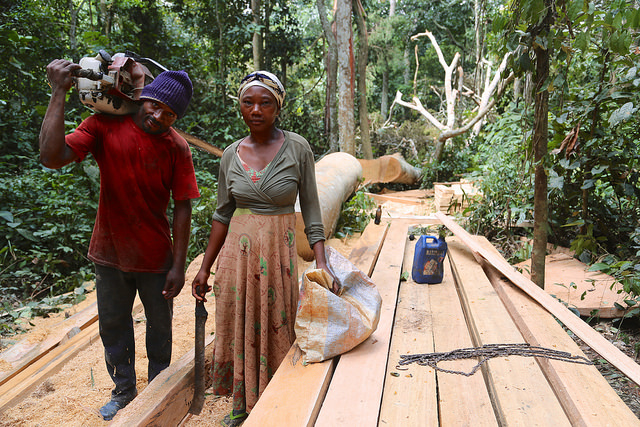A recent study presents the most comprehensive scientific analysis of illegal logging to date. Its findings indicate that one third of tropical timber traded globally comes from illegal deforestation.
“Forestry crime including corporate crimes and illegal logging account for up to $152 billion every year, more than all official development aid combined,” said Erik Solheim, Head of UN Environment, one of the partner organizations supporting the assessment.
More than 40 scientists around the world, including several scientists from the Center for International Forestry Research (CIFOR), produced the report. The study was coordinated by the International Union of Forest Research Organisations (IUFRO) in association with the Collaborative Partnership on Forests (CPF).
Researchers found that bilateral trade agreements between producer and consumer countries- like the European Union’s Forest Law Enforcement, Governance and Trade Action Plan (FLEGT), which requires timber products imported into the EU be legally sourced – have prompted shifts in the timber trade from industrial export-oriented markets to small-scale logging operations for the domestic market.
This pattern can be observed in Cameroon, Africa’s largest exporter of tropical hardwood to the EU, most of which is sawn timber that goes to Italy and Spain. Due to a lack of government regulation concerning the domestic wood sector, approximately half of the country’s timber is sold on the black market.
Timber produced for domestic consumption is generally absent from official statistics and produced without a valid permit. But now, under a voluntary partnership agreement signed with the EU under FLEGT, Cameroon is developing the systems needed to control, verify and license legal timber.
This video documents the challenges facing small-scale loggers in Cameroon. The country’s entire domestic timber sector is marked by informal practices, from felling trees to selling sawnwood. Although informal methods do not respect all the national regulations, they do not necessarily break the law either. This is why researchers prefer the word ‘informal’ to ‘illegal.’
We want you to share Forests News content, which is licensed under Creative Commons Attribution-NonCommercial-ShareAlike 4.0 International (CC BY-NC-SA 4.0). This means you are free to redistribute our material for non-commercial purposes. All we ask is that you give Forests News appropriate credit and link to the original Forests News content, indicate if changes were made, and distribute your contributions under the same Creative Commons license. You must notify Forests News if you repost, reprint or reuse our materials by contacting forestsnews@cifor-icraf.org.
